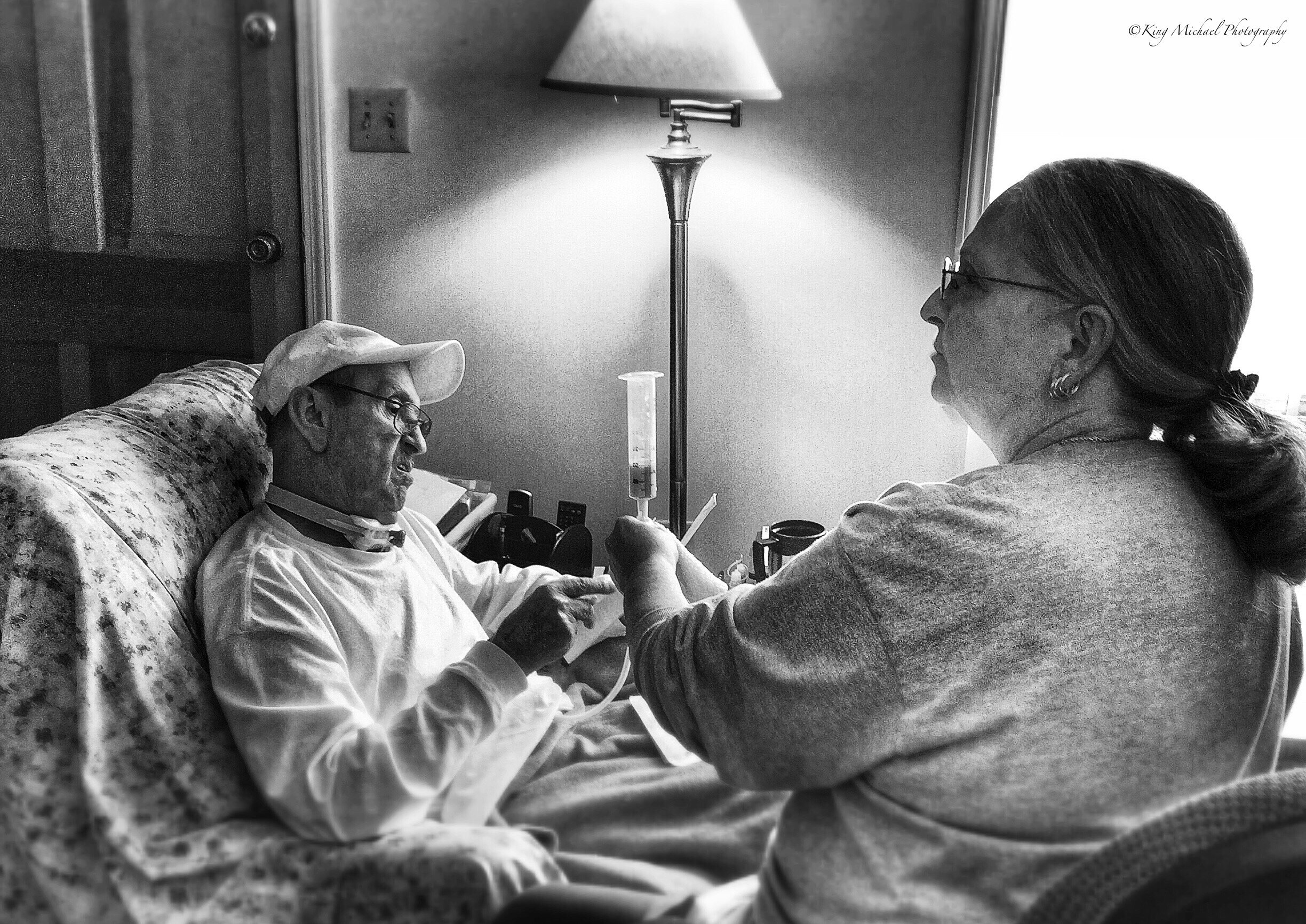Coping with loss: How anticipatory grief affects caregiver well-being
by Katie Wright | Sep 06, 2021 | family support, Family caregiving, dealing with grief | 0 Comments

The topic is loss. If you’re a caregiver you’re familiar with loss because you’re dealing with a unique version of it.
It’s more than the suffering you endure following the death of a loved one. The feeling of loss is an extra weight that emerges early in your caregiving relationship when your person becomes ill. It’s a process that may span months or years.
As you witness a decline in your loved one’s health, the grief begins. You experience an erosion of their vitality and their independence. You watch the gradual disappearance of the person they used to be and the life you once shared.
You realize your own independence is compromised as your primary focus turns to your loved one’s well-being.
You may find yourself experiencing a kind of mourning.
This is anticipatory grief and can be as painful as what you expect to feel following their death.
Anticipatory grief is a powerful driver in many caregiving relationships. Taking time to understand this common emotional upheaval may help you learn ways to cope with it.
How do caregivers experience anticipatory grief?
A serious illness or disability that results in a caregiving relationship offers you loss right from the start. It’s the loss of the way life with your loved one used to be.
The health you hoped would sustain them for years to come is compromised.
Your identity as a daughter, spouse, or friend is obscured as your primary role becomes that of caregiver.
Uncertainty about the road ahead replaces any assurance you might have felt about future plans.
You might experience resentment when you realize you’ve lost control and even your best efforts can’t change the eventual outcome.
And so you begin to grieve.
Author and psychologist Mary Pipher describes it as full-body despair.
Anticipatory grief can leave caregivers in a confusing place. You may fluctuate between being hopeful and losing hope. You may feel anger – at your loved one, at their medical provider, and at yourself.
You may wonder if your loved one would be better off dead. And then feel consumed with guilt for thinking this way.
Ambiguous loss - an offshoot of anticipatory grief
If you’re caring for someone with memory loss your anticipatory grief may turn into feelings of what author Pauline Boss, Ph.D., describes as ambiguous loss.
When your loved one suffers from dementia, Alzheimer’s, or traumatic brain injury, they may seem present one moment and gone the next. They may be with you physically but absent mentally.
Caring for someone with memory loss is like riding a roller coaster and not knowing what’s around the next curve.
Author Lee Woodruff described this as “…the half-light of that in-between place” as she described the recovery from traumatic brain injury suffered in Iraq by her husband, reporter Bob Woodruff. The Woodruff family’s grief was complicated and ambiguous because although Bob didn’t die of his injury, there was tremendous uncertainty about his recovery.
Former National Football League Coach Tom Laughlin recently offered a guest essay to the New York Times describing his struggles – his own feelings of ambiguous loss – with watching his beloved wife of 54 years slip away with a brain disorder. He aptly described his role as a caregiver in coaching terms. “Admittedly, transitioning from being with an N.F.L. franchise to full-time caregiver wasn’t easy. It’s still not easy. The playbook is either changing by the minute or so numbingly repetitious, you lose track of time and self.”
Ways caregivers can manage anticipatory grief and ambiguous loss
If you experience these emotions as a caregiver, you’re trying to absorb something unacceptable – that your loved one is in their final life stage.
There are ways to manage this grief, and in a way, accept the unacceptable. This doesn’t mean believing the illness and eventual death are OK. It means you can learn to cope and continue to move forward.
Learn as much as you can about your loved one’s condition. Stay on top of medications and possible side effects and common symptoms. While you may want to hear a prognosis, try to concentrate more on your loved one’s comfort and day-to-day functioning. Being educated about their condition might help you feel like you’re a little more in control.
Accept that some things will feel unmanageable and focus on doing what you can. When there’s uncertainty with someone’s condition, do what you can to maintain their comfort and see to their basic needs. Caregiving is hard and you can’t do it perfectly – learn to feel OK with whatever support you can provide.
Practice a technique called “both/and” thinking. This is challenging because it means learning to balance opposing thoughts – positive and not positive – at the same time. Some examples are:
- I am both troubled by my loved one’s illness and soothed in knowing she’s well-cared-for.
- I both wish she would pass so her suffering could be over and want to keep her beautiful presence near me for a long time.
- I both no longer feel like his partner in marriage and realize that although the definition of our relationship has changed, the love is still there.
When a discouraging thought crosses your mind, think of a positive counterpoint. It’s a temporary solution for dealing with your loved one’s memory loss, but you can think of this technique as a way to come to grips with that in-between, ambiguous place.
Anticipate change and plan for it. As you become more familiar with your loved one’s illness, you’ll realize that a decline in health also means change. You may not know what turns the situation will take, but you can adopt a mindset of being prepared.
Find moment-to-moment pleasure in simple things. Take your loved one for a walk in fresh air if possible. Read to them. Play some music you know they enjoy. Sing. Watch a TV show you both enjoy. Remember that physical touch – an embrace or hand-holding – provides warmth and familiarity. Make this last chapter of your loved one’s life as meaningful as possible.
Don’t give up on family celebrations, but reframe them. If you have some meaningful rituals or family gatherings, don’t abandon them. Think about ways to make special events meaningful for your loved one, even if they can’t fully understand what’s happening. This is an important way for family members to understand your loved one’s changes and connect with them. Make it simple and heartfelt.
Enlist some help. It’s a good time to reach out to friends and family, both for your loved one’s benefit and especially for your own. Having some links to the outside world will help you feel more alive. If you can get out and do some things for yourself – like getting a haircut or watching a movie – you’ll be reminded that your life will one day go on as usual, and pick up where you left off. Think about hiring a part-time professional caregiver for some peace of mind and a break – the SeaCare staff is happy to discuss options with you.
Find someone who’s experiencing the same thing. Anticipatory grief affects most caregivers and family members. Share your frustrations and joys – anyone who has experienced caregiving can readily identify and may provide helpful insight. The AgingCare Newsletter offers a good caregiver forum that highlights real-life questions and encourages reader responses (scroll down to sign up for the newsletter).
Another way to connect with others who share your experience is through Community Living Connections for Seattle & King County.
Give yourself something to be hopeful about. When things seem particularly grim, it’s important to imagine a future positive event you can hang onto, even if it seems far away – like travel plans or a dinner and movie outing with an old friend. The goal is to come up with something that has a specific outcome that you can rely on, no matter how minor. This can help to temper the ambiguity you feel.
Coping with your final loss
When your loved one dies, you face life without that person. You also face moving on without the caregiving responsibilities that may have consumed years of your life. You may have mixed feelings about re-establishing relationships outside of your caregiving situation. There are big adjustments ahead for you.
Kristine Kevorkian, Ph.D., reminds caregivers that their feelings following a death may be different than those of other grieving family and friends. You may feel relief that your loved one’s suffering has ended, along with relief that your difficult caregiving duties are over. And this may lead to feelings of guilt for having these thoughts.
Much has been written about bereavement and coping with the loss of loved ones. Expressing grief rather than keeping it inside is recognized as one healing method.
It might involve a special phone call.
A particularly poignant story came out of Japan a few years ago about a phone booth with a disconnected rotary phone. It’s located on a hillside overlooking the Pacific Ocean near Otsuchi, Japan, a town that lost some 800 of its residents in the 2011 tsunami. Its creator called it “phone of the wind” because it offers people a chance to call their dead relatives and leave oral messages which the wind will carry away. These expressions of grief provide an outlet for the unbearable sadness many feel when someone they love dies.
There’s a wonderful fictional account of the phone booth available through the King County and Seattle Public Library systems – The Phone Booth at the Edge of the World by Laura Imai Messina (published 2021).
The staff at SeaCare understands how anticipatory grief can be overwhelming to family caregivers. We offer customized, affordable in-home care options to help you manage your loved one’s care and tend to your own well-being. Contact us for details about our focus on care that preserves quality of life.
Katie Wright writes about aging and senior wellness from Bellingham, WA. You can read more about her here.
If you or a loved one you know are looking for additional support during this time and are interested in scheduling a free in-home assessment, please contact SeaCare In-Home Care Services today! A SeaCare family member is standing by. 425-559-4339.



0 Comments